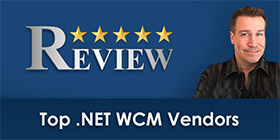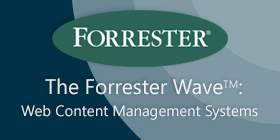Top .NET CMS, Solution Selling, Forrester & More.
This week on CMS-Connected, reviews seemed to dominate the conversation but we still snuck in some talk of solution selling, recommendation engines and even an acquisition suspicion we may just see come to fruition in the next few years.
A Fair Review of the Top .NET CMS Platforms
There can be a bit of confusion when it comes to the comparison of WCM systems out there in the

marketplace. Systems can be misrepresented as a WCM system, when they are better suited for a comparison in the digital marketing world, or better yet, comparing WordPress to Sitecore when their differences far, far outweigh their similarities. This all muddies the water for those who are looking for an honest comparison that will help them choose their best-fit solution, and not confuse them on the basic definition is of what they are looking for.
For this reason, our President and Principal Analyst Gary Eisenstein kicked off the week by writing an article entitled
“A Fair Review of the Top .NET CMS Platforms” wherein which he listed, in his opinion, the best .NET WCM systems that have a strong presence in North America, a strong market penetration, provide stable releases and have good corporate governance.
The overarching benefit, is the same details are listed for each vendor, so prospective clients or even those who simply want to be educated on these players and what they have the offer, can concisely compare each to know how they are the same, as well as what makes them different.
Read the full article here.
Is Salesforce Oracle’s Next Acquisition?

With Salesforce’s $5 billion buying spree last year, it’s interesting to think that they could be eyed up for purchase by an even larger entity, and some think that buyer could be Oracle. The founders of each have a storied history, with Marc Benioff being a former Oracle alum and some say a protégé of Larry Ellison, the founder of Oracle. They’ve engaged in a war of words at times, but they do share some key perspectives, so it’s a wonder what could materialize in the coming years of the two coming together.
As Venus points out, some industry insiders see Ellison’s appointing of two CEOs when he stepped down from the positon as not being a final call, and rather a primer for an acquisition and perhaps Benioff returning to Oracle as a final caretaker when Ellison leaves. Venus also points out the agenda of each organization, how they differ but also, what Salesforce has achieved that could make them a smart acquisition to fill the gaps Oracle needs in order to reach their goals.
Microsoft could also be a suitor for Salesforce, if it’s possible sale becomes more common knowledge, similarly to when LinkedIn was suddenly on the market and the two battled to be the one to own the social network for professionals. Either way, no matter who acquires Salesforce, if its up for grabs, it’s tough to say if the deal with pass through the European Union and SEC regulations, given that it could become a threat to the future of innovation and competition by monopolizing the market. The storyline of these three players will be an interesting one as time moves forward.
Read the full article here.
Solution Selling: Hurdle or Helpful in Getting to Yes?
Mid-week, one of our contributors, Cathy McKnight discussed a common topic of thought but what might not

be a common topic of discussion, Solution Selling, one of the many methods of selling technology in the market today.
As described by Cathy:
“Solution selling refers to the practice of uncovering a customer's pain points and then providing products and services that address the underlying business problem. This approach is diametrically opposed to more typical/traditional technology sales practices that focus on the features and functionality of technology products, with little regard for the context of the prospective client’s business challenges they are hoping to address with new technology.”
She addressed the common reasons sales teams might say solution selling is not for them, and admits it is in fact a team effort
“best led by practitioners with a customer-centric mindset”, but I think the biggest take away, is how perhaps more effort up front could mean more closes later on.
A sales team member could list the bells and whistles of a system all day to a prospective client, but if the buyer is not shown how those features relate to their specific needs the words are likely falling on deaf ears. IF a buyer has enough interest, they may take those features on their own and assimilate them to their needs, but wouldn’t the sales person want the chance to better influence that conversation? Having worked in sales, I would say I’ve never sold anything the same way twice, even if I am pitching the same exact product to the same exact customer, I am going change my pitch to nail down even more accurately, what I have to offer that is significant to their individual needs.
Again Cathy said it best with
“Ultimately solution selling is an inclusive approach that takes into consideration both what the vendor has to offer and what the customer is looking for/needs, and finding the solution (or not) where those two essential elements meet.”
Here at CMS-Connected, we strive to be an educational resource among other things, so were pleased to see this lovely feedback from Evan Hartman, from our post in a LinkedIn Marketing and Communications group:
Forrester Evaluates Top Web Content Management Systems

This week, Forrester released
"The Forrester Wave: Web Content Management Systems, Q1 2017", where they evaluated 15 platforms, listing Acquia, Adobe, and Episerver as
“leaders”; Hippo, Sitecore, and SDL were named
“strong performers”; OpenText Teamsite, IBM, e-Spirit, Progress Software, Oracle, Jahia, Crownpeak, and Magnolia were
"Contenders" whereas OpenText WEM was the solitary
“Challenger”.
As soon as the report was published, we reached out to Forrester’s Senior Analyst Mark Grannan, and while a few things were discussed, this is what he had to say with regard to the state of the CMS industry:
“Today, we are shedding those archaic concepts and moving into the third phase, where the focus is more around dynamic experiences supported with a wealth of other data. We are cross-pollinating them with functional capabilities coming out of commerce solutions or analytic solutions.” He also discussed how going beyond the web has become mainstream and stressed: “The notion of moving beyond the web is probably one of the most powerful elements of evolution. In that scope, API-based content delivery and microservices are hugely important.” In addition, Mark touched on changing enterprise requirements and also, about their criteria for the report and how it changes over time.
To discuss the vendors featured, Venus has an article up her sleeve that will be released bright and early Monday morning, where she will feature exclusive quotes from four of those featured where they weigh in with their thoughts on being included.
Read the full article here.
The ROI of Recommendation Engines
Recommendation engines are one of those things I feel fly under the radar for the common shopper when

they express their weary feelings toward machine-learning. As if one is not associated with the other, but when asked, a consumer might not know the answer to how a site can make these great product recommendations for them, as if they happen by magic.
As Venus points out in her end of the week article, one of the primary factors behind the story of Amazon becoming the multi-billion dollar behemoth it is, is it's integrated recommendations. There seems to be a big disconnect however, for many businesses to fully understand the best way to capitalize on recommendations and measure the ROI. To educate those who are curious, Venus listed the three most common approaches, content-based filtering, item-to-item collaboaraive filtering and, hybrid recommender systems.
Why they work, is the brain candy for me reading this article as human behavior, and specifically consumer behavior is a huge interest of mine. People want to feel known, but at the same time some are afraid of ‘machines’ knowing them too closely and that fact makes them feel uneasy. The difference? Convenience vs intrusion. If you can recommend products as a convenience and make someones life easier, they’ll take it, but come on too strong and begin to annoy them, they’ll likley be soured on the brand. Balance here, is key.
Then there is the other side of the coin, the social factor. The idea is nothing new but today given the huge power of media, influencers and status being viewed not only by our peers but by a whole wide world of social media, ‘keeping up with the Jones’ has reached an entirely new level. Recommendation engines can work in this way as well, if a consumer feels like an item is popular or is recommended by their favorite athlete, YouTube star, or social icon, they’re more likely to purchase it.
It's the understanding of those factors and knowing how to best leverage them, where businesses will see the ROI of recommendation engines.
Read the full article here.

Laura Myers
A digital business, marketing and social media enthusiast, Laura thrives on asking unique, insightful questions to ignite conversation. At an event or remotely, she enjoys any opportunity to connect with like-minded people in the industry.